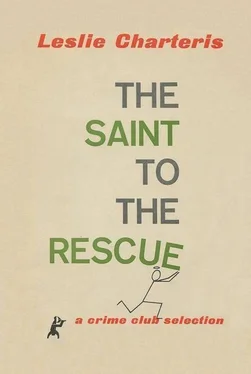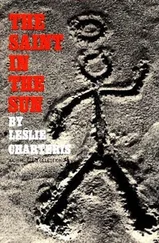Leslie Charteris - The Saint to the Rescue
Здесь есть возможность читать онлайн «Leslie Charteris - The Saint to the Rescue» весь текст электронной книги совершенно бесплатно (целиком полную версию без сокращений). В некоторых случаях можно слушать аудио, скачать через торрент в формате fb2 и присутствует краткое содержание. Город: Garden City, NY, Год выпуска: 1959, ISBN: 1959, Издательство: The Crime Club, Doubleday & Company, Жанр: Крутой детектив, на английском языке. Описание произведения, (предисловие) а так же отзывы посетителей доступны на портале библиотеки ЛибКат.
- Название:The Saint to the Rescue
- Автор:
- Издательство:The Crime Club, Doubleday & Company
- Жанр:
- Год:1959
- Город:Garden City, NY
- ISBN:978-147784293-5
- Рейтинг книги:5 / 5. Голосов: 1
-
Избранное:Добавить в избранное
- Отзывы:
-
Ваша оценка:
- 100
- 1
- 2
- 3
- 4
- 5
The Saint to the Rescue: краткое содержание, описание и аннотация
Предлагаем к чтению аннотацию, описание, краткое содержание или предисловие (зависит от того, что написал сам автор книги «The Saint to the Rescue»). Если вы не нашли необходимую информацию о книге — напишите в комментариях, мы постараемся отыскать её.
The Saint to the Rescue — читать онлайн бесплатно полную книгу (весь текст) целиком
Ниже представлен текст книги, разбитый по страницам. Система сохранения места последней прочитанной страницы, позволяет с удобством читать онлайн бесплатно книгу «The Saint to the Rescue», без необходимости каждый раз заново искать на чём Вы остановились. Поставьте закладку, и сможете в любой момент перейти на страницу, на которой закончили чтение.
Интервал:
Закладка:
Mr Theocritus Way, this chronicler must now hasten to establish, was not the bookie immortalized in the foregoing anecdote. He was however, a man who had concentrated on the subject of Odds with an almost comparably classic single-mindedness.
Indeed, one of his oldest but perennially profitable discoveries in the field was directly tied to the same numerical quibble between Odds and Evens. At any bar where he might be chumming for potential suckers, when the inevitable dispute eventually arose as to who should buy another drink, he would promptly suggest that they match for it. The mark could hardly refuse this, and would take from his pocket the conventional single coin. Mr Way would then say, with a skillfully intangible sneer, “The hell with that penny-matching stuff. That’s how some guys got rich making doubled-headed coins. Let’s play Monte Carlo Match.”
He always had some high-sounding name, suggestive of authenticity and tradition, for the games that he invented.
“What’s that?” the innocent would ask.
Mr Way would haul out a handful of small change, which he jingled noisily in his closed fist to leave no doubt that it was a fair quantity.
“I got a mess of chickenfeed here,” he would explain, with labored patience for such ignorance. “You grab a stack from your own pocket. We slap it all on the bar — two stacks. Suppose your stack turns out to be an odd number, and the total of our two stacks is also an odd number, you win. Suppose you got an odd number, and the total of us two is even, you lose. Or vice versa. That’s one bet you can’t fix, because neither of us knows how many coins the other’s going to have.”
The mark might win or lose the first time, on this fair fifty-fifty basis. Mr Way rather liked him to win, because that made it somewhat easier to insist on another match for money instead of drinks. And one game easily led to another, and another, for increasing stakes. If the dupe insisted on them taking turns as matcher, Mr Way would take his honest fifty-fifty chance. But after the first time, the victim never had a chance to match the total of their combined hands in oddness or evenness.
Whenever the other was trying to “match,” Mr Way simply took care to have some odd number of coins in his own stack. Therefore if the mug also had an odd number, the total had to be even, if the mug had an even number, the joint total had to be odd. Stated this way, an intelligent reader will see that the stupe would have had the same fifty-fifty chance of finding somebody with a right foot growing naturally on his left leg. But it was a gimmick which had paid Mr Way more cash dividends than Albert Einstein ever earned from the Theory of Relativity.
The fond parent who had him baptized Theocritus was only another of the human race’s uncounted casualties to misguided optimism. Even in his tenderest years, his contemporaries declined to accord him even the semi-dignified contraction of “Theo.” They abbreviated him swiftly and spontaneously to “Tick.” The record does not show whether this was initially due to his instinct for stretching credit to the snapping point whenever he was supposed to do the paying, to his physically insignificant stature, or to his extraordinarily irritating personality, or to a combination of all three. But the monicker clung to him like fly-paper into the middle-aged maturity where his path crossed the Saint’s, which is the only encounter this short story is seriously concerned with.
However, in contradiction of some recent propaganda which purports to attribute all adult crime to the cancerous frustration of the growing boy, it must be instantly said that “Tick” Way consistently collected above-average grades, and revealed an especial talent for mathematics. But instead of being thus inspired to think of a career in science or engineering, his temperament had been impressed only by the magnificent possibilities of pigeon-plucking that were opened up by the magical craft of figures.
In his middle forties he was still a runt, barely topping five feet in his built-up shoes, but broad and thick-set and now somewhat paunchy, a strutting little rooster of a man with all the aggressiveness with which the small ones are prone to over-compensate for their unimpressive size, and a toughly amorphous face which looked as if he had antagonized more than one person whose resentment was too convulsive to be conveyed without physical amplification. But if he was doomed by his chromosomes to be forever unformidable in a fight, he had a grasp of the immutable laws of probability that might have frightened an insecurely wired electronic brain.
For “Tick” Way, the comparatively obvious percentages of dice were teen-age stuff. He had nothing but contempt for the half-sharp crapshooters who knew that the true odds were three to one against a natural on the first roll, two to one against making a point of ten, and thirty-five to one against making it the hard way — only because they had read the figures in a book. He could work out all those simple chances in his own head and even knew how to project them into the more elaborate calculation which ends up showing that the shooter has only a 49.3 per cent chance of passing when he takes the dice.
The higher complexities of poker were not much harder for him. He did not have to memorize the odds of twenty-three to one against drawing two cards to make a flush, or ninety-seven to one against drawing three that would turn a pair into a full house. He could even prove on paper the paradoxical theorem that when holding two pairs against an opponent who you are sure has threes, you have a better chance of taking the pot if you discard your smaller pair and buy three new cards than if you timidly trade your maverick for just one that you hope will fill the hand.
Mr Way had long since relegated such overworked games to the category of minor pastimes or last resorts. For one thing, he had also learned a few things about the mechanical methods of loading, shaving, switching, marking, and otherwise hocusing cards and dice, to say nothing of the sleights of hand (for which he himself had no natural aptitude whatever) in their manipulation, which could nullify the most comprehensive theoretical calculations. For another, he had found that a discouraging percentage of even the most verdant greenhorns had been forewarned through the modern media of Sunday newspaper supplements, paperback fiction, B pictures and television, of the hazards of playing games with strangers. And thirdly, the relatively fractional edge that a brain with a built-in slide rule might give him in conventional gambling was too small and laborious in the payola to satisfy his driving ambitions. He would prefer to cash in any day on some proposition in which his advantage could be measured not in fractions, but in fat round numbers.
Simon Templar first saw him in action at the bar of the Interplanetary Hotel in Miami Beach. Every season during this era of seemingly endless expansion saw the opening of some gleaming new caravanserai which aspired to be the “hotel of the year” — bigger, grander, gaudier, more modern, more luxurious, and more expensive than all the jam-packed hundreds of other palaces to which it added its opulence — which for a few dizzy months would skim the cream of the traffic before it yielded to the hotel of next year which was even then in the girder stage on the adjoining lot. The period of this story is fatally pinpointed by the mere mention of the Interplanetary Hotel, which obviously staked its début on the fact that solemn citizens who once automatically dismissed science fiction as a form of juvenile escapism were currently pontificating about rockets to the moon and pondering the legal tricks that might have to be invoked to grab off the largest hunk of the lunar market. The entrepreneurs of this palatial pub had already nailed their seats on the bandwagon by having the lobby laid out on the lines of some futuristic concept, of a space port, decorating the main dining room with symbols aimed at striking a happy compromise between astronomy and astrology, branding their plushier accommodations with such labels as “The Martian Suite” or “The Venusian Suite,” and barely stopping short of putting Plexiglas bubble helmets on the bellboys. And for that season, at least, they were assured of entertaining the loudest, lushest, most ostentatious fugitives from the northern, snows who were likely to get washed up on that excessively upholstered strand. The ideal subjects, in fact, for Mr Way’s studiously honed technique.
Читать дальшеИнтервал:
Закладка:
Похожие книги на «The Saint to the Rescue»
Представляем Вашему вниманию похожие книги на «The Saint to the Rescue» списком для выбора. Мы отобрали схожую по названию и смыслу литературу в надежде предоставить читателям больше вариантов отыскать новые, интересные, ещё непрочитанные произведения.
Обсуждение, отзывы о книге «The Saint to the Rescue» и просто собственные мнения читателей. Оставьте ваши комментарии, напишите, что Вы думаете о произведении, его смысле или главных героях. Укажите что конкретно понравилось, а что нет, и почему Вы так считаете.












